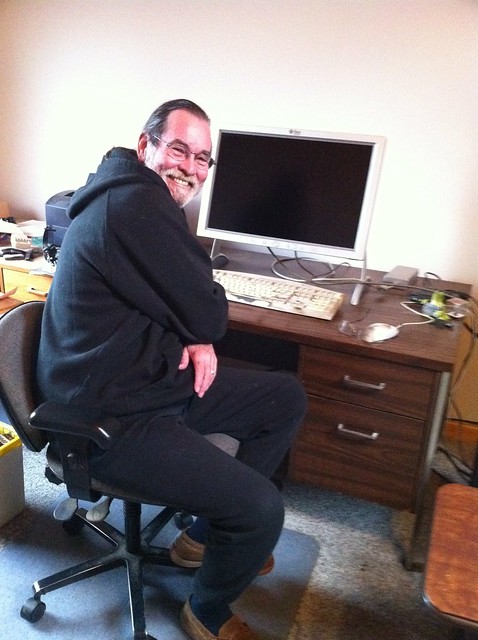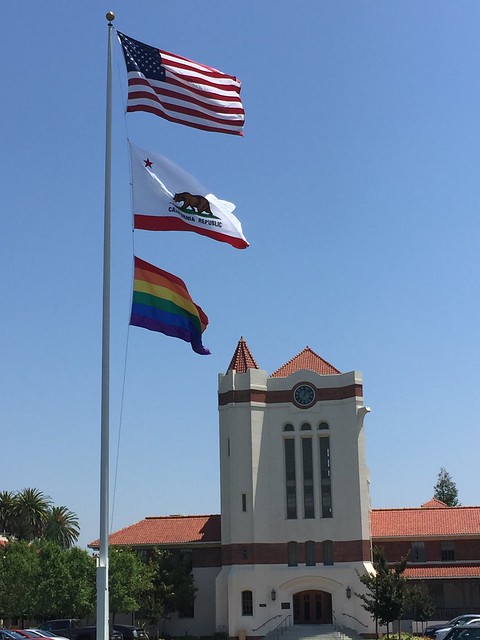Professor Joan C. Williams, Hastings Foundation Chair; Director, Center for WorkLife Law; University of California, Hastings College of the Law.
I had read Joan's book -
What Works for Women at Work - and LOVED it, so I was so happy to see Oracle brought her onsite! Her book was well researched and science based, and gives lots of great everyday strategies for women in today's workplace.
She interviewed more than 100 successful women, and did additional research. Ninety-six percent of all women interviewed had experienced at least one type of bias at work.
She wrote an article for Harvard Business Review, "Why We Hate Our Offices: And how to build a workspace that you can love".
The first type of bias is "Prove it Again!" syndrome, experienced by 68% of the business women and scientists she interviewed.
One gentleman she interviewed had transitioned from being a woman, and stayed in the same field of science. He overheard people, who were confused about who the female was with the same last name, that "his work s so much better than his sister's". He doesn't have a sister - that was his work, published when he was a man.
There is the "stolen idea" syndrome - you expect great ideas to come from men, so don't hear it when it comes from a woman.
Women's and men's mistakes are remembered differently, and many of these same biases also apply across racial lines. For example, people were asked to review a legal memo - the same memo, with the same errors - but when reviewers thought they were reviewing a document by a black man - they found more errors.
What's the most important factor in determining networks? Similarity, attractiveness and location.
How does this play out in the workplace? In an org where people on top are a certain demographic, they are going to sponsor people who are like them (A sponsor is a mentor that is willing to spend their political capital to help their mentee's career). Men tend to be judged on their potential, women on their results. This gets them stuck in the "prove it again" loop.
Women of color trigger two sets of negative stereotypes: gender and race.
When they interviewed scientists they were surprised that women of Asian descent reported the "prove it again" strategy more often then white women, even though we thought their was a stereotype that Asians were good at science. Apparently the women in this group were exempt from that positive stereotype.
So, how to get out of it? Well, prove it again - but try not to burn out. Keep careful, real-time records that track your accomplishments. When you get compliments? Forward the email to your sponsor and manager.
How can manager's level the playing field for women? Look around - who are you sponsoring. Is there a certain patter? do you need to widen out the group. Male managers sometimes worry that taking a woman out to lunch or coffee would look "weird" - it doesn't. If you would do it with the men you were sponsoring, then it should be appropriate for women. Now, if you do a lot of your bonding in the men's locker room... then you need to think about doing this in ways where it wouldn't matter if you were sponsoring a man or a woman (mentoring, etc0.
Imagine you are sitting in a meeting and you see the stolen idea occur. How do you intervene? Lot's of ideas, but saying something is better than nothing. Something like, "thanks, Paul, for going back to that, I've been pondering that ever since Pam brought it up"
What if you are sitting in a meeting and you see men being judged on their potential; women on their performance - how would you intervene? This happens a lot when it comes to promotions, women are often already doing the job before they get the promotion. One idea for getting around this: suggest evaluating the engineers first by their accomplishments, then by potential. Another: Are we being consistent here? Or, now that we know what we're looking for, let's go back to the top of the pile and re-review everyone.
Often the most savvy way to call out bias is not to mention that's what you're doing :-)
What works for organizational prove-it again: set up precommitment to what is important (for promotion, for example), and when someone varies from there they need to have justification.
Women are expected to be nice and communal - and nice. Men are expected to competent and "agentic" (assertive, direct, competitive and ambitious). Nobody thinks of a strong leader as "nice", so women often aren't even considered for leadership positions.
This varies by culture - US/Canada and UK believe a leader should be independent, risk takers, direct and focus on tasks. It's opposite in India/China/Japan: Interdependent, certainty, indirect and have a focus on relationships.
Ben Barres, the transgendered scientist, noted that "by far, the biggest difference is people treat me with respect. I'm interrupted less" since becoming a man.
How you stand and sit telegraphs power or submission. To demonstrate authority, stand with feet apart - stable.
Ellen Pao was described as both as "passive, too quiet at meetings" and "entitled, demanding".
Women get pressure to be deferential or play the office mom - always deliver, but never threaten. Women are pressured to do the office housework: planning parties, getting gifts, note taking, scheduling meetings, mentoring, and do the undervalued work (paperwork, etc).
But, if you're stern or say no - you're not modest or nice. You become the "B" word.
As a women, you need to claim your seat at the table and practice power poses. You need to learn how to get a word in edgewise - learn how to politely interrupt: "Oh, I'm sorry, I thought you were done."
What works for one woman won't work for another. You need to be authentic, and no when to say no (and how!).
Managers - how to handle "office housework"? Don't ask for volunteers - women will be under gender stereotype to volunteer. Assign true admin and housework to admins or true support personnel. Possibly, for things like minutes, do a rotation.
Spread the load and set norms. For example, everyone does one "citizenship task" - sitting on committees, and everyone does their own ordering, billing, etc.
There was a non peer reviewed study on performance evaluations. Men got specific feedback. Women got things like "bossy, abrasive, strident, aggressive, emotional, irrational" - very strong prescriptive gender bias.
Women also are impacted by maternity bias - mothers are 79% less likely to be hired, are held to higher standards for punctuality, offered lower starting salaries and promoted less.
Indisputably competent and committed mothers are seen as LESS likable, particularly by women.
Mothers are not offered stretch positions because people assume she's busy with kids. Managers: don't assume! If she's the best person, offer it - and let her know that similar positions will be available in the future if now is not a good time.
There is this false sense that only one woman can get promoted, get an award, etc - so they will compete with each other, instead of working together.
A study found that not one female legal secretary expressed preference to work with a female lawyer as a boss. "Females are harder on their female assistants, more detail oriented, and they have to try harder to prove themselves, so they put that on you."
Older women in the workplace discourage younger mothers from working part time after maternity leave, because "I worked full time right away and my kids are fine". That is, "I did it the hard way, why can't you."
One study found that women without children work more unpaid hours of overtime than anyone else in the workplace, seen as a pathetic spinster - so why can't you work these hours?
To get organizational change: do a "4 patterns assessment" - is bias playing out in everyday work interactions? Then develop an objective metric to test whether what women think is happening is, and make adjustments.
Example: given the study of performance reviews, companies should be reviewing their reviews for this language and see if it's mentioning bias based negative personality traits? Look at objective metric: promotion rates. Interrupt: have someone trained to spot bias read all performance evaluations (or use an app), and redesign evaluations and provide workshops for your managers.
We all have unconscious bias. This is usually not malicious. But if you are ignorant, who's fault is that? We need to be aware and take action to counteract it.












